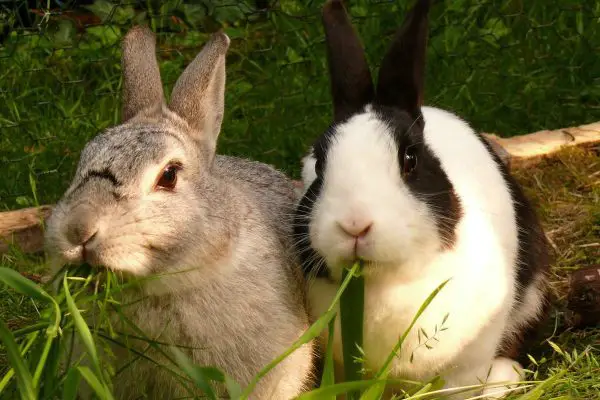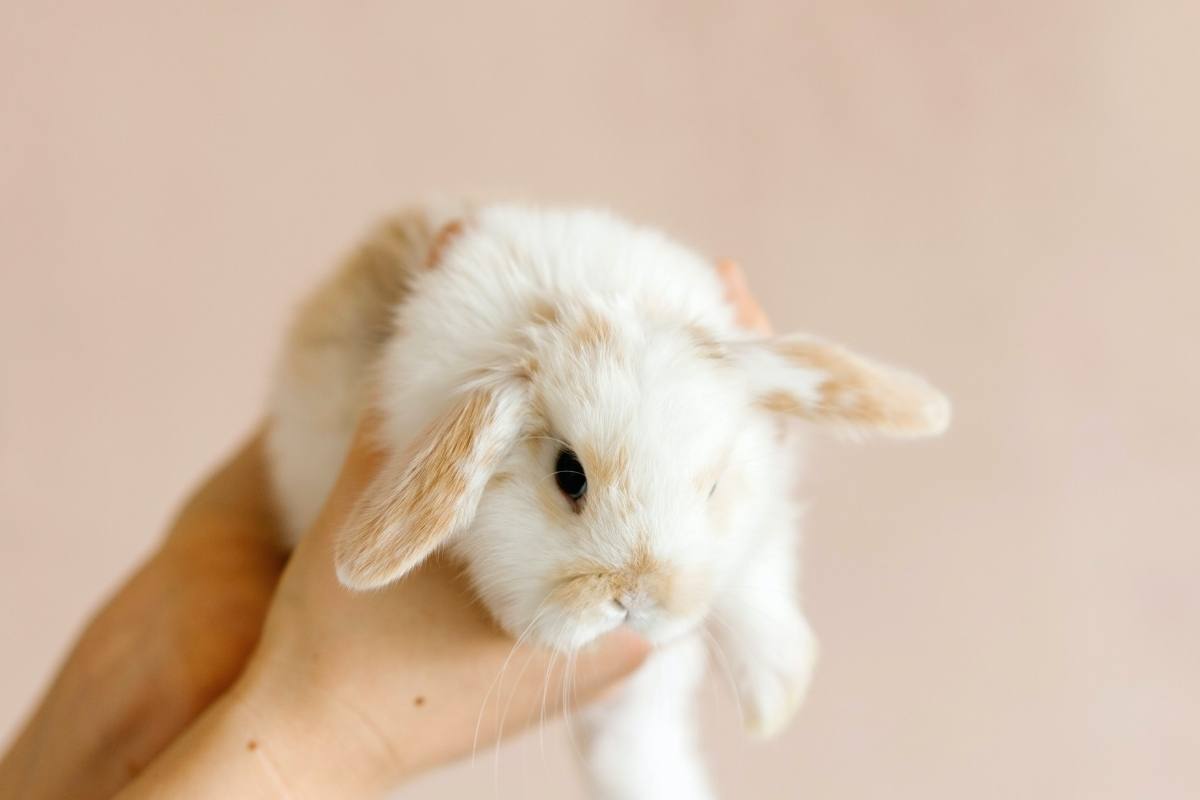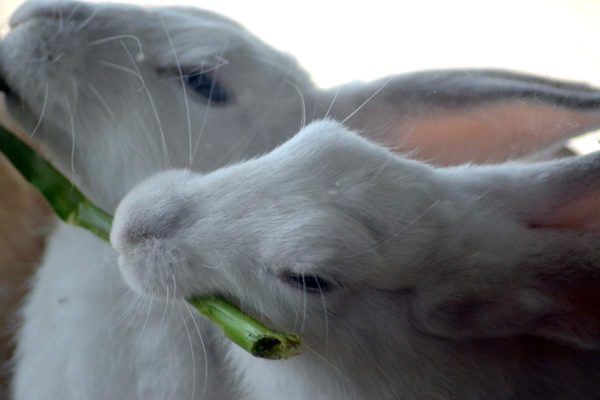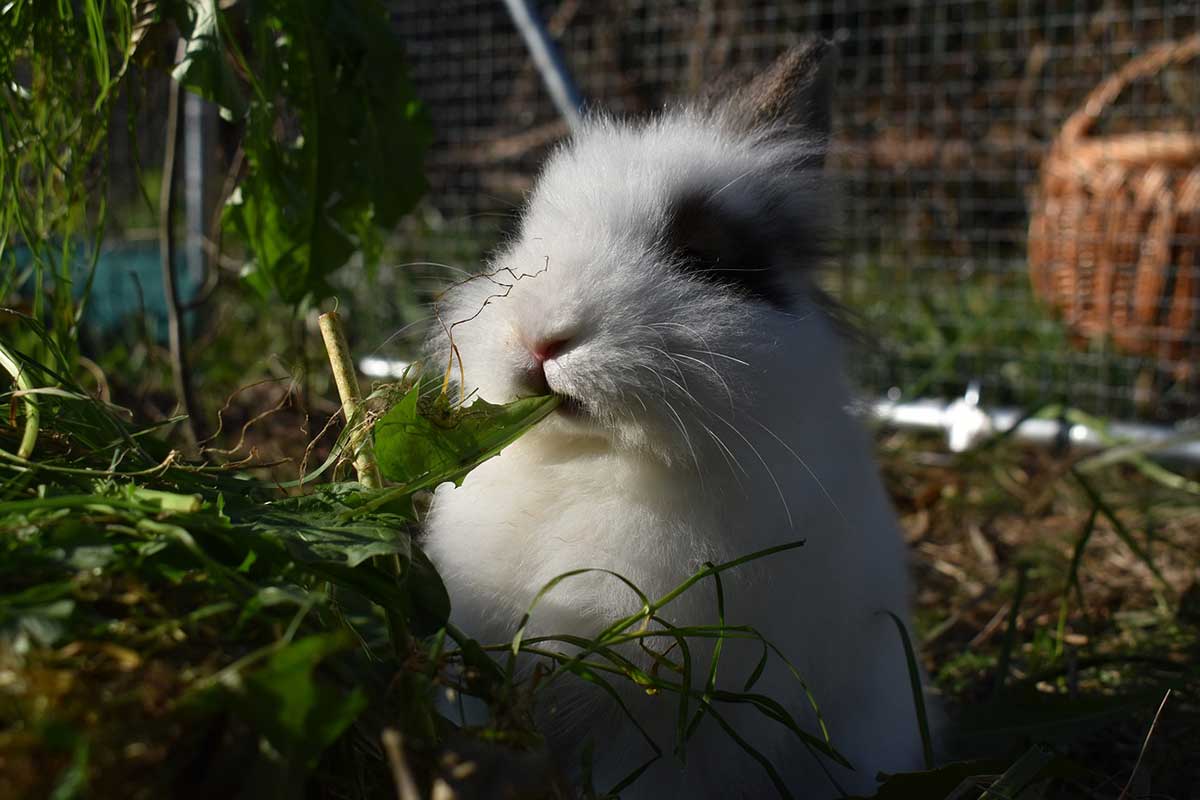For coming in such small, furry packages, rabbits have big personalities. Sometimes, however, it is difficult for humans to differentiate between bunny behaviors that are personality quirks or something more, such as chewing on nothing. This behavior likely has a reasonable explanation, but as always it is important to understand your bunny and all the factors that could be driving its behavior.
So, why does my rabbit look like he’s chewing? The most likely explanation is that your rabbit is grinding his teeth to keep them filed, which is natural and normal.
This article will cover the natural reasons behind your rabbit’s chewing behavior including teeth filing, boredom, and potential pain or dental issues. We will also discuss some hazards your pet’s chewing presents, as well as ways to help your companion curb its sometimes-destructive habits.
Rabbits Are Natural Chewers

Rabbits have open-rooted teeth, which means they grow continuously throughout a rabbit’s life. These teeth are an evolutionary product of a wild rabbit’s diet. Rabbits in the wild must always be grazing and eating to sustain their energy, but nice, soft grass is not always available.
Sometimes wild rabbits graze on more rough-textured fare like weeds, branches, and twigs. Because of this constant growth, rabbits must always keep their teeth filed by chewing on things or grinding their teeth together to file them.
Even domestic rabbits have a biological urge to chew or grind. Without this behavior, rabbits, particularly domestic rabbits, have a hard time controlling their ever-growing teeth, which can sometimes lead to dental and oral issues.
Most people with rabbits in their homes are acutely aware of how much rabbits like to chew; they chew incessantly and on anything they can sink those big front teeth into! As mentioned above, rabbits in the wild chew on a wide range of various plants and grasses throughout the day, driven by a biological urge that is shared by their domestic cousins.
Our homebound companions, however, do not typically have quite so many options, so in addition to their own diet and toys many will “chew” or grind their teeth to control growth. This behavior is quite natural and nothing to be worried about unless the behavior is accompanied by other signs or symptoms, which we will discuss shortly.
It is important to make sure your bunny has plenty of toys to chew on, both to help them keep those big teeth filed, and to ensure they do not grow bored or frustrated in their domestic setting.
Boredom or Frustration

Rabbits are naturally quite energetic creatures. In the wild they are considered “prey animals,” which means they have very keen senses and lots of speed and agility to evade potential predators.
The combination of constant grazing we discussed earlier coupled with that natural speed and agility ensures rabbits in the wild always have more than enough energy reserved if they need it. Domestic rabbits do not have much to run from, but they still have more than enough energy to burn.
If our furry friends are not given enough playtime and outlets to burn that energy, the resulting boredom can be destructive at best, and potentially problematic for their health at worst.
In addition to the biological urge to chew, rabbits also have a strong urge to burrow. These behaviors translate to one another energy-wise, so a domestic rabbit with a little bit of energy to burn may try to burrow.
If it does not have anywhere to go, excessive chewing may become the only outlet they have. While this may not necessarily be an immediate problem, it could easily turn into a health issue for your friend, which we will cover soon.
As such, domestic rabbits need plenty of options for burning energy, including lots of chewing choices. Below are just a few things you can give your rabbit to chew on to ward off boredom and help their teeth:
- Hay such as oat, timothy, or orchard grass
- Branches from trees such as willow or aspen
- Pine firewood or untreated fresh pine lumber
- Cotton towels
- Untreated wicker baskets
When you give your cotton-tailed companion an item to chew on, make sure you have double-checked that it is safe for them to chew and cannot be ingested.
If your bunny has healthy teeth and plenty of playtime and chewing options, but still seems to be chewing excessively, there may be underlying dental or oral problems driving the behavior.
Oral Health
A rabbit’s teeth are central to the way it interacts with its environment and the world around it.
We already discussed the more obvious uses our companions have for their teeth like chewing or expressing boredom, but rabbits also use their teeth to communicate happiness or pain, to change aspects of their environment, to groom themselves or family members and companions, and even to explore new environments or mark their territory.
Despite the crucial nature of these tiny tools, there are quite a few things that can go wrong with them, especially in domestic rabbits.
Some of the more common problems that can occur with a rabbit’s teeth are malocclusion of the front teeth known as incisors (when the top and bottom teeth do not meet properly), split or broken teeth, molar spurs, abscesses, infections, or warts.
Further, the very behavior we are here to discuss, chewing with no food, could cause some of these issues as well, particularly split or broken teeth.
Prevention and early detection can go a long way in protecting your companion’s chompers. Something as simple as conducting regular checks of your rabbit’s teeth and jaw could spare both you and your bunny the pain and frustration of some of the above conditions.
Sometimes, however, despite our best efforts, illness or health issues strike our furry friends anyway. Below are some problems to look for if you are worried your rabbit might be suffering from a dental health issue:
- Excessive or uncharacteristic drooling or wetness around the mouth
- Swelling, warmth, or demonstration of visible pain around the jawline
- Sudden change in food preference
- Eating less while still showing an interest in food, or attempting to eat but dropping the food
- Sudden weight loss
- Loose teeth
- Red or purple gum tissue
If you have noticed that your rabbit’s chewing behavior is accompanied by symptoms like those above, it could indicate a dental or oral condition that should be addressed by a veterinarian. If a dental condition is detected early enough, it can likely be treated quickly and without much pain or strife for you or your cotton-tailed companion.
While it is important to understand your rabbit’s oral health and facilitate healthy outlets for their chewing behavior, it is also worth noting that there are some things to watch out for to ensure the safety of your bunny and everyone else in your home.
Safety and Chewing Hazards

You now know that without enough options for chewing and burning energy, rabbits will grind their teeth and look for any channel possible to get that energy out. If your rabbit is free roaming or spends lots of time outside the cage, the legs of your unsuspecting furniture typically pay the price.
Rabbits often nibble on wooden furniture legs, plastic children’s furniture, and even through the fabric and stuffing of couch cushions or pillows.
Many of these materials, especially if they are chemically treated or stained, can be toxic to rabbits. Additionally, electrical wires often present as interesting things to chew on for our furry friends, which could unfortunately lead to painful or fatal electric shock for your bunny.
Chewed electrical wires could also result in damage to your electronics and wall outlets and have been known to spark electrical fires in homes.
Therefore, in a combined effort to enable your companion’s natural instincts, care for their dental health, and protect them and your home from harm, it is important to fully understand your rabbit’s needs, and those funny teeth are crucial in maintaining that understanding.
Conclusion
While it is somewhat perplexing to us humans to watch our companions chewing on nothing, this behavior is most likely your rabbit’s natural way of being its own dentist and filing its ever-growing teeth to keep them healthy.
A rabbit’s biological urge to chew is primarily what drives this behavior, so it is important for us give them plenty of outlets to do so. Additionally, it is crucial that a rabbit’s human companion keep an eye out for potential health problems if excessive chewing becomes a problem.
But with careful observation, understanding, and preventative actions, we can help keep our furry friends pearly whites perfectly healthy for years to come.

